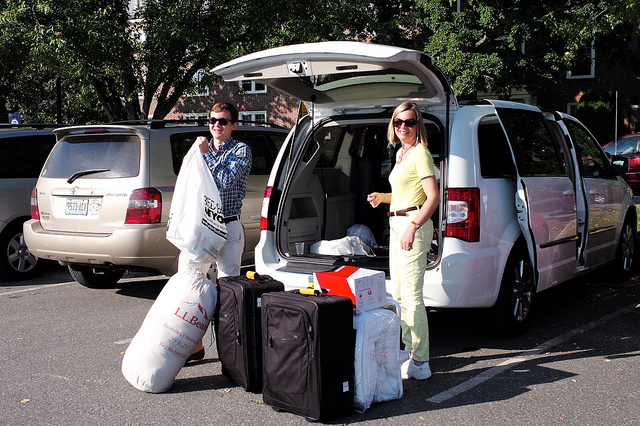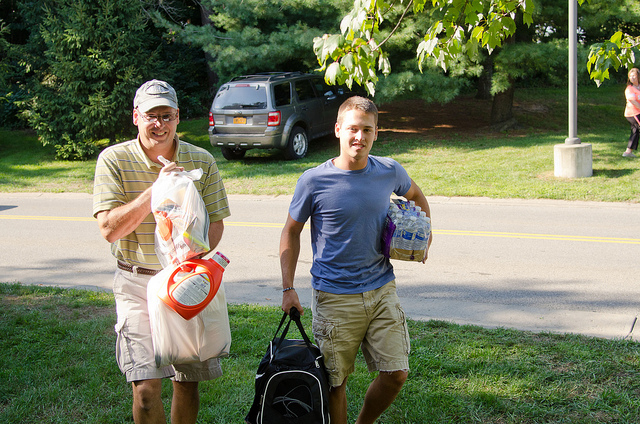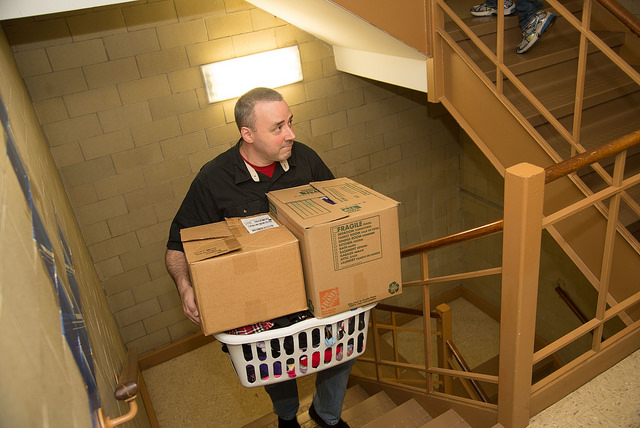Freshman year is exciting, and everything about it is brand new. You probably had a whirlwind tour of the campus back when you narrowed down your choices to the top three universities you wanted to attend, but that day and all of its details are probably a blur in your mind.

Photo by Nazareth College/Flickr
You need facts and a plan before college move-in day arrives. Whether you use a legal pad or create a spreadsheet, write everything down. Even your exuberant freshman memory can fail you, and you do not want to be hundreds of miles away and realize you forgot an important college moving policy or an item you wanted to bring.
Start your college move by familiarizing yourself with what your college expects of you. Most colleges and universities give clear outlines of how they expect move-in day to go – this will be available on their website and probably in any welcome packets you received as well.
The following list will get you started thinking about things that can be overlooked or go wrong on college move-in day. The official day that schools choose for students to move their belongings in may not be a day when all services are functioning. Cafeterias may still be closed, and facilities for receiving packages may not open until days later. Be sure to research your college’s specific move-in policies and create your own list, which will look something like this:

Photo by Roman Boed/Flickr
You’ll want to start planning for your move as soon as you are officially enrolled. Waiting until the last minute to figure out how you will get yourself and your stuff to your new living quarters can be disastrous.
Airline tickets cost much more when booked at the last minute, and they have restrictions and fees for extra luggage.
If you are driving yourself, remember that some schools prohibit freshmen from having a vehicle on campus, so be sure to double-check your school’s vehicle policy.
If Mom and Dad are driving you, where can they park? Do you need to arrange for accommodations if they are staying overnight? Hundreds of freshman and their families will be arriving at the same time as you, so your parents may have a hard time finding last minute accommodations near the school. If they plan to stay for a day or so before driving home, encourage them to book a hotel room as early as possible.
You don’t have to miss out on all the fun of college move-in day just because you’ve planned so carefully – the opposite is true! Because you’re prepared, you’ll have plenty of free time to participate in new college activities and welcoming events.
Here are a few things to plan around on the drive and physical move to college:
If you have to rent a moving truck or van for a cross-country drive to your school rather than taking a smaller, more fuel-efficient vehicle, check the costs for shipping what you need for your dorm or off-campus living space. Some moving companies offer what they call a pod or portable storage cube. They are shipping containers that customers fill themselves. Then the moving company delivers it to the address where you will unload it, and the company picks up the empty container when you are done. Some schools may have a designated area for student items that are being delivered by professional companies. Be aware that the area where the pod or cube is kept may be across the campus from the dorm.
Shipping boxes with carriers such as UPS, FEDEX and through the post office may sound pricey. However, depending on how much you can actually fit into a small dorm room, it may be more cost effective than renting a vehicle to move your stuff. Just be sure to know what happens to things you ship once they arrive at your school. Boxes arriving before you should be kept in a secure location such as in a mail room or inside your locked dorm room. Be sure to know the days and hours you can pick up shipped items if they are stored somewhere on campus.

Photo by Nazareth College/Flickr
Shipping items and buying new items on-site is necessary due to luggage fees and item restrictions for flights. However, if you are flying in with a relative who plans to help you get set up at school, ask if they can go light on what they take to leave room for things you need. This cuts down on your shipping costs.
If Mom and Dad are just planning on staying overnight, take advantage of the maximum amount of luggage they are allotted for the flight. They might get by with just a carry-on, and you can bring all of your clothes in the luggage space they are not using. Also, some pre-booking agencies have a bonus of upping your baggage allowance if you use their services. Be sure to check with your airline for pre-paid excess baggage rates that are likely lower than fees charged at the airport check-in desk.
Just take what you need, but be prepared for professors that have a dress code for classes. Read the syllabus for each course you are taking. Will you need your own lab coat and safety glasses? Is there a footwear requirement for labs? Casual clothing is prohibited by some professors of students seeking certain degrees, like a business degree. Still, just pack what you need. If you are taking courses in Florida and home is in Maine, you are not likely going to need your winter parka. However, if the reverse is true, you probably should buy one.
Obviously, fashionistas will have a more difficult time leaving clothes behind, but those extra sweaters, jackets, shoes and jeans add up to a considerable amount of packed weight. Keep in mind that each outfit, with shoes, weighs about two pounds. Rather than packing 50 outfits weighing close to 100 pounds that you will not have enough room in your dorm to store anyway, pack your clothes smartly instead. Everyone else in the dorm has the same amount of room, so do not worry about being the odd person out. Make a plan for mixing and matching outfits for classes, part-time work, lounging and socializing. Be prepared, and pack for the climate you are moving to, not the one you are moving from. Try to pack clothing and shoes suitable for more than one situation or occasion.

Photo by Nazareth College/Flickr
Your first year away from home at college is bound to come with gift cards and cash to buy some new things. Relatives may already be asking if you will need a microwave, coffee maker, mini fridge and other items. All of these items are great to have where allowed, but they are heavy to transport.
Instead of buying them and shipping them or driving them to college, buy them online at the same national chain stores you normally would. Then, arrange to have them picked up at the store closest to your school. Just be sure of the ship-to-store policies, especially how long the store will hold the items for you.
Do not expect to buy exactly what you need at nearby stores once you arrive. Freshman move-in day will be hectic enough, and many other students may have the same idea. Some schools precisely regulate the sizes and types of appliances such as microwave ovens and refrigerators. The stores are likely to be out of the exact items you need, but if you have ordered online, they will be waiting for you to pick them up.
Save boxes that new items come in by recycling the internal packing materials, and then opening boxes to fold them flat. They store neatly in the back of a closet, can be re-taped shut on move-out day, and towels and other cloth items can be used in place of the foam packing for stabilization.
Regardless of whether you are living in a dorm or in off-campus housing, everything you bring with you and accumulate through the year must be cleared out at the end of the school year. Packing up and moving out can sometimes take longer and cost more than moving in.
Students who plan to return the next semester may find that going in together to rent a nearby storage unit for the summer is the best option. However, there are some things to consider before storing items:

Photo by Nazareth College/Flickr
In addition to packing or buying things you need for your first experience living away from home, you should also mentally prepare. Mentally run through your private list of what-ifs and worries; then research how others dealt with those concerns – forums and Google searches are a great way to find advice from peers. You can also ask for advice and encouragement from older friends, siblings, and relatives who remember their college experience. Learning to plan and prepare for something as benign as dorm living will help you in other endeavors in the adult world of careers, home, finances and family.
Some students relish the freedom of college so much that Ramen noodles for breakfast and very few outfits to wear are no big deal. Other students may feel so out of their normal routines the first few weeks away from home that they can barely stand it.
Taking the time to prepare yourself for both the physical move to college and the mental shift in perspective can only result in a successful freshman year.